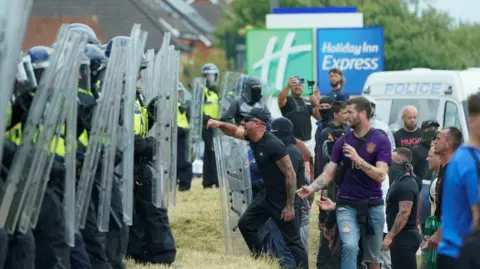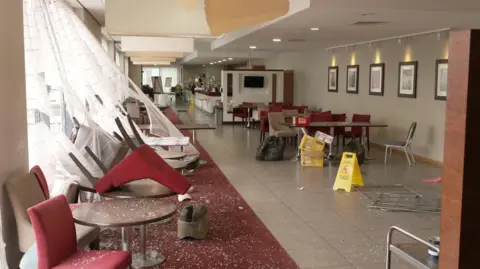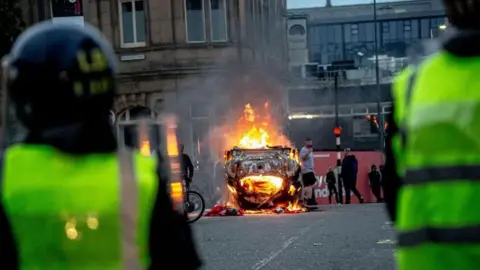Officers 'thought they would die' at hotel riot
 PA Media
PA MediaOfficers caught up in anti-immigration rioting in Rotherham "thought they were going to die" police federation representatives have said as a new report criticised the response to the UK-wide unrest.
Violence erupted at the Holiday Inn Express in Manvers on 4 August, with officers facing a barrage of missiles, including concrete blocks, chairs and fire extinguishers, as they sought to hold back protesters.
A new report praised the "immense bravery and personal sacrifice" of officers but said forces had underestimated the "rising tide of violence" and acted "too late".
Steve Kent, chairman of South Yorkshire Police Federation, said many officers were undergoing injury therapy and counselling as a result of "sickening hostility" they encountered.
More than 60 officers were injured when violence flared outside the hotel, which was being used to house more than 200 asylum seekers.
Mr Kent said: "There are some officers who I've spoken to who were at the London riots in the last decade and who were also at the Bradford riots in the decade before, and they said this was on a totally different level of the violence they encountered."
He said the federation was looking after officers but many more were coming forward with psychological effects.
"To face that prolonged terror that they faced for hours [the] officers I've spoken to thought they were going to die," he said.
"It's now when they're starting to reflect on what happened that we're seeing the psychological impact come to the fore."
Violence erupted across the country at the start of August following the deaths of three schoolgirls in a knife attack in Southport in Merseyside in July.
In September, the home secretary asked His Majesty's Inspectorate of Constabulary and Fire & Rescue Services to carry out a rapid review into the policing response to the disorder.
The published report said police intelligence should have "more fully" considered a series of earlier incidents that were indicators of future unrest.

The incidents highlighted included disorder near asylum seeker hotels in Merseyside and Rotherham in February 2023, as well as violence during Armistice Day in London.
"Our assessment of these incidents suggests that the risks of disorder were greater than the police believed them to be," the review said.
The review also found police chiefs brought in a system where officers are moved between forces to bolster resources too late.
It recommended the protocol should have been brought in on Friday 2 August, particularly as it was the start of the weekend and the weather was forecast to be good.
However, the system was not brought in until four days later, meaning there were too many incidents where static lines of officers were being pelted with missiles and there were not enough of them to arrest troublemakers, the watchdog found.
She told MPs: "Knowing what we know now, of course there are things we would have done differently."
 Getty Images
Getty ImagesChief Inspector of Constabulary Andy Cooke said: "We found the police decisions to co-ordinate and mobilise those public order officers nationally were made too late, and the police didn't have a proper intelligence picture of the rising tide of violence.
"There were gaps in their intelligence functions, especially around the analysis of social media and other dark web media, and no one understood or could counter the emerging cause and effect of that misinformation and disinformation.
"So the police failed adequately to denounce it or mitigate against it in real time to deter or curtail the disorder."
The review recommended impovements in forces' ability to respond to widespread violent disorder, their mobilisation of public order and public safety resources, and their support for officers and staff.
"There is every possibility that similar violence and disorder could reoccur across the UK. The police service needs to be ready to respond," said Chief Inspector Cooke
The watchdog will publish a further report in 2025 focused on how social media affected the riots.
Listen to highlights from South Yorkshire on BBC Sounds, catch up with the latest episode of Look North or tell us a story you think we should be covering here.
